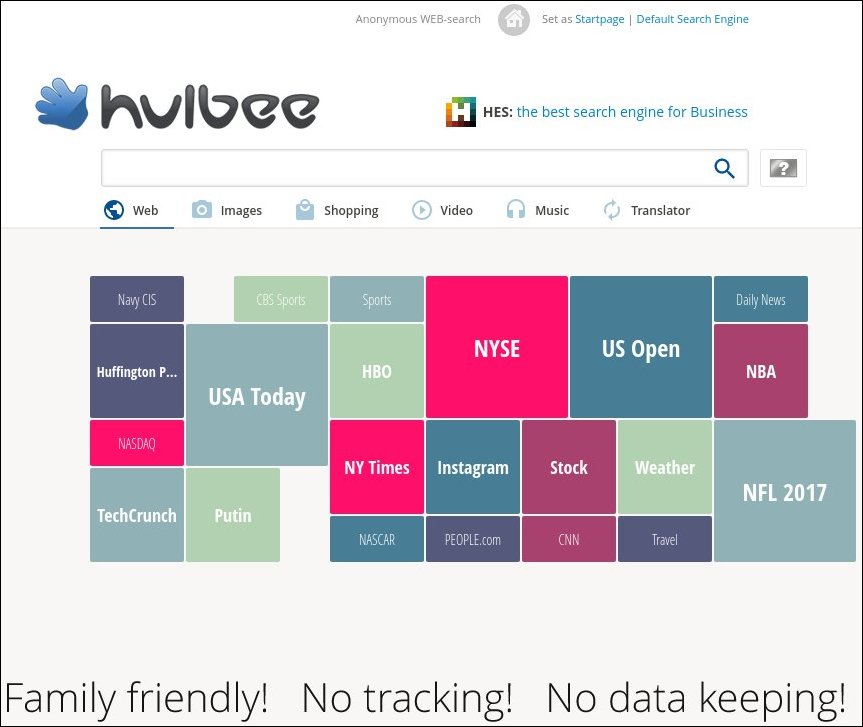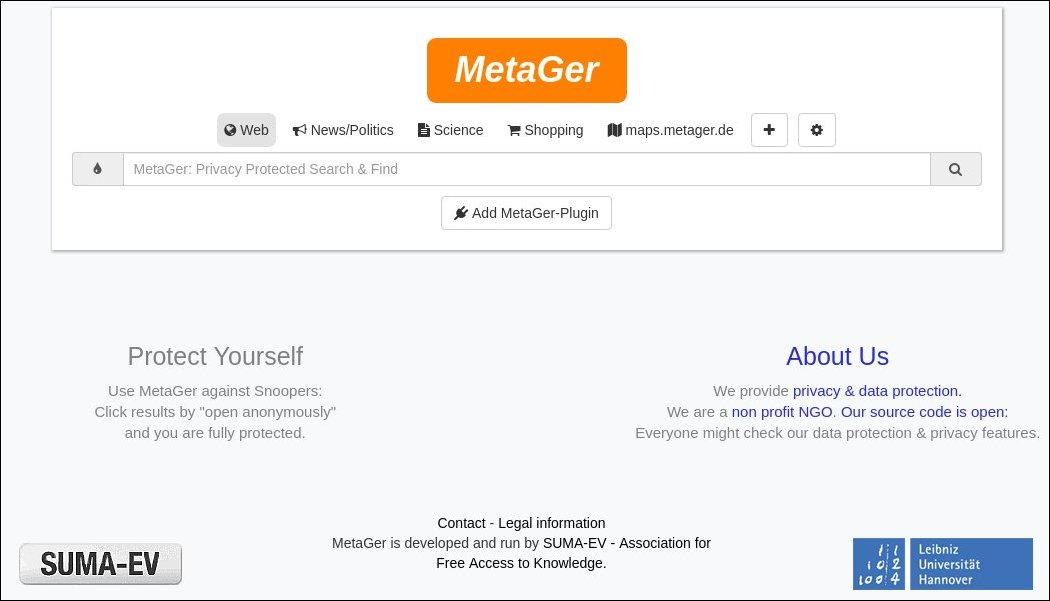| Previous
Page |
PCLinuxOS
Magazine |
PCLinuxOS |
Article List |
Disclaimer |
Next Page |
Search Privately With These 13 Search Engines |
|
by Paul Arnote (parnote) Can you remember a time when you could search for things on the internet without worrying about being targeted for advertising or having your search queries tracked? It has been quite some time since that has seemed possible. Internet users across the globe are tiring of the targeted ads that result from their internet search queries. They are also becoming more sophisticated in their desire to preserve their privacy, instead of having their every move (search) tracked across the whole internet. Privacy concerns regarding government and government agency access to our data is also becoming a major concern. Fortunately, it actually is possible today to do both. There are at least a baker's dozen (13) internet search engines that do not track you (and your search queries), and that do not target you with ads based on your search activity. While both seem to be cornerstones of Google's, Yahoo!'s, and Bing's business models, others seemed to have found a different business model that works well enough to at least keep them in business and pay the bills. So, let's take a look at these search engines. They are presented here in alphabetical order, so their order of presentation does not reflect any bias towards any particular search engine over another.  While Disconnect uses the services of Google, Yahoo! and Bing, it doesn't collect your IP address. It also doesn't track your online activity or searches. Furthermore, any personal information you do divulge to Disconnect is deleted within 30 days of them receiving a request for your personal information to be deleted.  Performing over 10,000,000 searches a day, DuckDuckGo is one of the better known private search engines. Their very secure -- and private -- search engine never tracks your searches, yet still manages to provide a very good search experience. DuckDuckGo never collects or stores your private and personal information, so there is never anything to delete. Because your search history is never stored or tracked, DuckDuckGo has nothing to sell to advertisers. Thus, there are no targeted ads served up based on your search activity. It also doesn't matter if you are using your browser in private browsing mode or not, it all works the same.  Based in Denmark, this search engine does not use Google, Yahoo!, or Bing to support its searches. A full service search engine that can be used to find web pages, images, videos and shopping, it draws its results from its own bot that crawls the web. Users can also contribute by rating the search results. Findx does not save your search history, does not track you, and no identifiable information is kept. While they will share your personal data if required by law, since they don't save any identifiable data, it is impossible for Findx to provide any data. Their privacy policy is clearly written, and easy to find.  Considered one of the best private search engines that keeps you almost entirely hidden from marketers and spammers, GigaBlast is also an open source search engine. The code is freely available on GitHub. GigaBlast maintains its own index of billions of web pages, and it provides real time info without compromising your search or browsing history.  Providing a private search engine that delivers instant search results, without tracking your search or location history, Hulbee provides relevant information. It never analyzes or stores the information from its visitors. All searches are encrypted, to thwart against middleman attacks and data leaks. You can optionally select a region where you want to search in to narrow down your search. You can also select to "clear your activity," to avoid leaving any trace of your visit behind.  Even though Lukol delivers customized search results from Google using a proxy server, it preserves your privacy by removing traceable elements from the search query. It is considered one of the best private search engines to protect from online fraudsters and keeping spammers away. It safeguards you from misleading or inappropriate sites, while ensuring full anonymity of your searches.  Based in Germany, MetaGer allows you to make confidential and untraceable searches that leave no footprints behind. It also integrates a proxy server that allows you to open any link anonymously from the search results page, yet keep your IP address hidden from the destination server. Since it never tracks your keywords, third parties and advertisers are denied the ability to serve up targeted ads, and malicious attacks are virtually eliminated. The link above will lead you to the English language search page.  Not allowing any tracking of any type is the name of the game for Oscobo. This anonymous search engine does not store or track user data in any way, nor does it allow any third party hack, mine, or misuse users' data.  While it may not be much to look at, Privatelee provides secure searches. It also provides strict filters, if you need them. Privatelee doesn't keep your search phrases to be used for ads or surveillance. It provides "power search" commands that allow you to configure your search. Based in Italy, it also goes by an alternative name, Qrobe.it.  Based in France, Qwant promises to not collect your data. In fact, they don't even put a cookie in your browser. If you want your settings to be remembered, you have the option of opening an anonymous account with Qwant. Otherwise, the search engine remembers nothing. They have a data protection staff member, and their privacy policy is well explained and clearly written. Search results come from crawling the web with its own bot, and may be complemented with Bing search data. You may see advertising, but it is not targeted advertising since Qwant does not track its users.  Startpage is probably one of the better known private search engines, especially among PCLinuxOS users. Startpage acts as an intermediary between you and Google. Startpage submits your search query to Google, and then Startpage strips out the tracking information from the Google results before providing them to you. Started in 2006, Startpage never stores any of your private information -- including your IP address -- and they never hand that information over to Google. Based in Europe, they operate in an arena that provides some of the strictest privacy protections anywhere. American companies, on the other hand, can be forced to turn user information over to the government or government agencies (like the NSA). Being in Europe, they are exempt from any U.S. data surveillance requirements. Since they never store any user information, Startpage has never handed over any user information to any government agency. After all, they can't give them what they don't have. Even Edward Snowden has said, "Be careful about what you share with large service providers. There are alternatives, like Startpage, that don't store that information." You can also connect to search results via a proxy link on the Startpage results, which helps insulate you from data collection by the destination site.  WolframAlpha is a computational knowledge engine. It provides very accurate answers and offers open knowledge. Its main purpose is to serve knowledge, and it does not track what you search for. It performs dynamic calculations using built-in algorithms, as well as delivering expert knowledge about calculations, people, money and finance, health and medicines, music and movies, and much, much more.  With Yippy, you can manually filter the results according to categories, and you can flag any inappropriate results. Yippy will allow you to view cached pages (from other search engines, such as Google), and filter the results by tags like sources, clouds and websites. Since Yippy does not track your search queries, it also does not display targeted ads. Other tips to help you browse securely and privately
I've collected a few other tips to help preserve your privacy while traveling around the Do not accept any of the major search engines cookies. They might use them to identify you later on. If you already have a Google or Bing search engine cookie on your computer, delete them. Do not sign up for email at the same search engine where you regularly search. Your personal email address can potentially be tied up to your search terms. Using Google and Gmail (both Google products) or Bing and Hotmail (both Microsoft products) together is not a good idea. Mix up a variety of search engines. This will spread all of your searched terms across different companies and servers. Varying the physical location you search from can also be helpful. You can use a VPN or proxy to change your computer and country IP, and delete all of your search engine cookies before starting a new private searching session. Summary Your privacy and your security are completely and solely in your hands and under your control. Using services who collect your data for financial gain (selling ads), who are known to be in cahoots with governments and government agencies hell bent on collecting as much of your private, sensitive data as possible, puts the onus and blame on no one but YOU. This is especially true when you knowingly continue to use certain service providers, even when armed with the knowledge of the service provider's transgressions. Remember that this has NOTHING to do with whether you have anything to hide or not. This has nothing to do with whether you are doing anything right or wrong, legal or illegal. You have a basic human right to your privacy, regardless what various regimes around the globe would prefer to have you believe. To quote a famous and historical U.S. figure, Benjamin Franklin said, "Those who would give up essential Liberty, to purchase a little temporary Safety, deserve neither Liberty nor Safety." |

